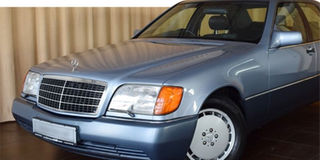Prime
Ask the Mechanic: Should I buy a 31-year-old car?

I have been eying this 31-year old car but before I pay, what should be my worries?
David.
Hello David, cars with 31-year-old engines qualify to be called ‘classic cars’ because they hold a lot of sentimental value. In most cases, a 31-year-old engine will be out of production with obsolete spare parts that may not be found at most parts shops. Therefore, replacement of ageing parts such as leaking oil seals, fuel lines, brake lines, brake cylinders and calipers, all filters, timing belt kits, carburetors and in worst cases internal engine components such as pistons and rings will be costly.
There are some benefits or positive considerations in favour of 31-year-old engines, especially if bought from a car enthusiast with good maintenance history. Classic engine repairs are easier, quicker and generally cheaper than newer engines. The technology in older engines is more mechanical and fixable as opposed to newer engines, which have complicated single use electric components with sensors and control modules.
Classic engine components were made of cast iron and steel and arguably, more durable and reliable than the current engine components made of alloy metals and plastic, which are more prone to failure. Classic engines tend to have simple technology that is less fuel efficient and powerful compared to newer engines which come with stratified direct fuel injection, variable valve timing as well as turbo charging.
However, the classic engines were arguably longer lasting and less sensitive to oil and fuel quality. To ensure that a 31-year-old engine serves you well, ask for the service history to know what long term maintenance is required. Thereafter, refer to the manufacturer’s user handbook to confirm the correct fluid and oil types required to service the engine. As a precaution, service all engine fluids and consider the age and condition of this engine as you select the engine oil to ensure correct viscosity.

HOW DO I MINIMISE DAMAGE FROM FLOOD WATER?
Is there anything I should do after driving through flood water?
Julie.
Hello Julie, you may sometimes find yourself trapped in flash floods while driving on rainy days. When you can, avoid driving through floods since they can cause severe damage to your car engine. However, if it is unavoidable, carry out the following checks after driving through floods:
Test your brakes. Pump your brakes several times. This is to ensure that they are dry enough to safely stop the car. Keep the engine idling with a few rev ups to clear the exhaust of any water that may have infiltrated through the exhaust tail pipes.
Pop the bonnet and check for debris, polythene bags or tree branches that may be lodged in the engine and could damage the fans.
Check fluids for contamination such as engine oil, transmission and differential fluids. In case of water intrusion through door seals, check the interior carpeting and upholstery for dampness, which may lead to bad odour.
Check the engine air cleaner for potential damage as it may have been exposed and damaged by water infiltrating the air intake pipe if your car does not have a snorkel.
Check all lights such as the headlights and tail lights.

HOW CAN I SAVE MONEY ON SERVICE?
I am currently strapped for cash, how do I save money on service?
Joel
Hello Joel, cutting corners or not servicing your car at all will not save you money but cost you more instead. However, there are a few tips you can follow to make your car service less costly. Get more involved in the maintenance of your car. Read more about the manufacturer recommended service intervals and fluids required. Choose your mechanic or provider carefully, use referrals or enquire.
Regular maintenance inspection will help you nip costly fixes in the bud or avoid expensive repair costs. Inspect all car fluids, brakes and tyres. Engine oil with sludge should be renewed on time to avoid damage of the engine, transmission fluid should be renewed at the manufacturer recommended interval or after checking its condition to save your gearbox.
Worn out brake pads should be replaced before they damage the costlier discs. Bald tyres should be replaced before you fail to stop and cause an accident. Keep tyres inflated in accordance to manufacturer recommended tyre pressures. Do not neglect the air cleaner and fuel your car with reputable fuel products. This will save you money and time.

WHY IS MY CAR BLOWING WHITE SMOKE?
I recently changed the water pump and timing belt on my Ford Fiesta. Why is white smoke coming from the exhaust?
Jude.
Hello Jude, without looking at the repair history I think your car must have had an overheating episode that may have damaged the engine cylinder head gasket. This could be the reason why the water pump was replaced. White smoke from the exhaust is usually caused by engine coolant intrusion in the engine due to a bad cylinder head gasket. This can be established easily at a garage.
Your mechanic might want to check that this coolant intrusion into the ignition system is not cross flowing into the lubrication system. This can be ruled out by checking if there are no traces of milky fluid in the coolant reservoir or engine oil dipstick.
Send sms: mycar (space) your comments and questions to 6933 or email them to: [email protected]




